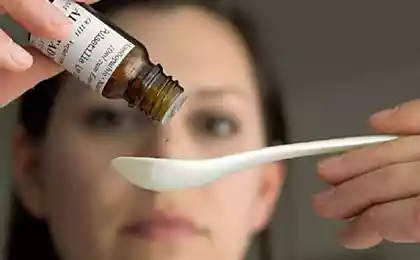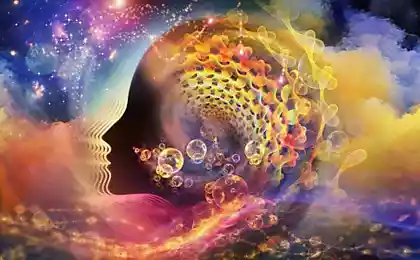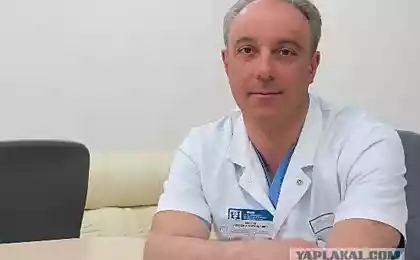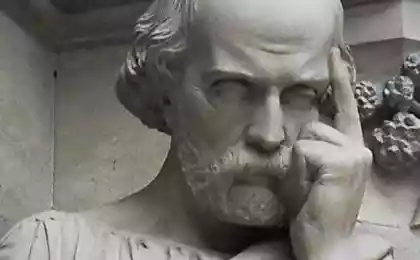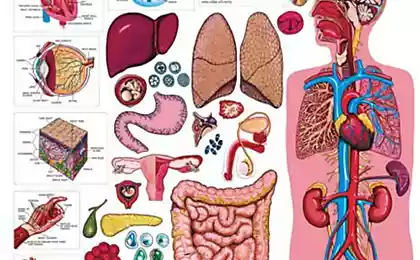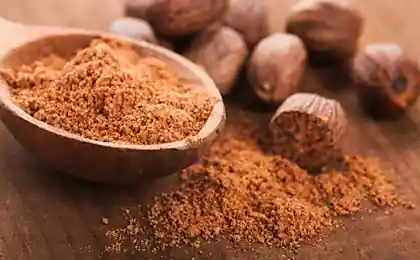162
Should you be treated with homeopathy?
You can treat homeopathy differently: some do not take it seriously, considering it a relic of the past, others, on the contrary, consider it a panacea for all ills and medicine of the future.

DepositPhotos
“We are being treated by a homeopath,” someone in the company says meaningfully, and a heated argument immediately breaks out.

DepositPhotos
One thing is indisputable: for 200 years of clinical use, homeopathy has not lost its relevance at all, on the contrary, it is gaining momentum, becoming more and more popular.
The father of classical homeopathy was the German physician Christian Friedrich Samuel Hahnemann (1755-1843). When he began to practice, he quickly realized that most of the methods of modern medicine were useless.

The then risky bloodletting, drugs based on toxic mercury and lead, useless enemas were more likely to interfere with patients than cure them.

Hahnemann noticed that quinine, which treats malaria, causes fever in him. And since the main symptom of malaria is a high fever, he decided that any disease could be treated with the remedy that causes its symptoms.

DepositPhotos
Thus, he justified the first homeopathyIt is known as Simila similibus curantur ("the like is treated like"). The very word “homeopathy”, invented by Hahnemann, means “like a disease”.
The principle of treatment like this played a role in the development of classical medicine. An example is vaccine prevention: the disease is prevented by the introduction into the human body of microscopic doses of a weakened or killed pathogen.

The second principle of homeopathy was the law of small (minimal) doses: the smaller the dose, the more sensitive the body reacts to it.
Hahnemann determined that the dose should be reduced until, in an incomprehensible way, the poison passed into its opposite and became a medicine. To do this, the active substance is sequentially diluted in water or alcohol solution 10, 100, 1000, 10000 or more times.
Microdoses are the favorite argument of skeptics. They argue that at high degrees of dilution in the drug may not remain a single molecule of the original substance. *
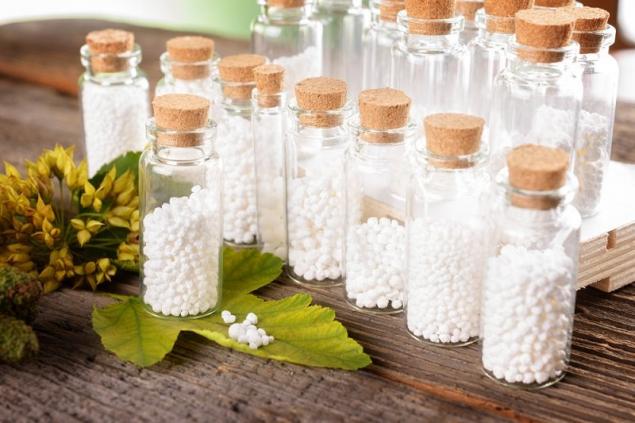
DepositPhotos
However, in homeopathy there are several degrees of dilution. And in mass practice, decimal dilutions D4, D6, D8 or hundredth 5CH, 9CH, or 15CH are more often used, in which residues of the substance can still be installed.
Today, the homeopathy market, according to the European Coalition of Homeopathic Product Manufacturers, adds 6.4% per year and has already grown to 1.24 billion euros. Analysts explain that the growth is due to the fact that modern man has reached the limit of consumption of conventional drugs.

So, the average European eats 20 packages of drugs per year, and during his life - 14 thousand (!) tablets. Excessive use of drugs leads to widespread chronic diseases and high mortality from drug poisoning.
In Moscow, 73% of all poisonings are drug poisonings. Eventually, the side effects of the drugs begin to outweigh their benefits, leading patients to seek alternative treatments and turn to homeopathy.
“Today, about 10% of doctors in the Russian Federation prescribe homeopathic drugs,” says the chief otolaryngologist of Moscow, Professor Tatyana Garashchenko, “and in the treatment of respiratory diseases, they already compete with classical antiviral.”
Moreover, since 2007, homeopathic antiviral drugs have been included in the list of drugs recommended by the Moscow Health Department for the prevention of influenza.

For many patients, homeopathy is an outdated folk method of healing. There are people who generally confuse it with herbal medicine or traditional medicine. As you can see, so many people have opinions about homeopathy. And so many misconceptions.
Editorial "Site" Here are 10 reasons to trust homeopathy and use it for treatment. If there are specialists in the field of homeopathy among the readers, then we are ready to publish other opinions or objections about the stated topic.
10 Reasons to Trust Homeopathy
It should be noted that the Russian Academy of Sciences in 2017 officially recognized homeopathy as pseudoscience. This is reported in a press release of the Commission on combating pseudoscience and falsification of scientific research under the Presidium of the Russian Academy of Sciences.
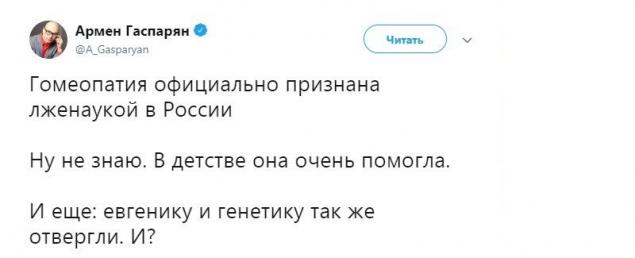
Among Internet users, the RAS statement found both support and criticism. For example, commentators either jokingly or seriously compared the attempt to ban homeopathy with the persecution of cybernetics in the USSR. Some linked the recommendations of scientists with an attempt to make money on the sale of pharmaceuticals.

At the same time, millions of people around the world have no doubt that homeopathic treatment works. To trust or not to trust your health is up to you.

Homeopathic remedies are widely used for the treatment and prevention of acute respiratory infections, including in children. Earlier, we have already acquainted readers with the opinion about homeopathy of the famous pediatrician Eugene Olegovich Komarovsky.
Editorial "Site" This is a list of the most useless drugs of our time. Before running to the pharmacy for another advertised drug, be sure to study its composition.

DepositPhotos
“We are being treated by a homeopath,” someone in the company says meaningfully, and a heated argument immediately breaks out.

DepositPhotos
One thing is indisputable: for 200 years of clinical use, homeopathy has not lost its relevance at all, on the contrary, it is gaining momentum, becoming more and more popular.
The father of classical homeopathy was the German physician Christian Friedrich Samuel Hahnemann (1755-1843). When he began to practice, he quickly realized that most of the methods of modern medicine were useless.

The then risky bloodletting, drugs based on toxic mercury and lead, useless enemas were more likely to interfere with patients than cure them.

Hahnemann noticed that quinine, which treats malaria, causes fever in him. And since the main symptom of malaria is a high fever, he decided that any disease could be treated with the remedy that causes its symptoms.

DepositPhotos
Thus, he justified the first homeopathyIt is known as Simila similibus curantur ("the like is treated like"). The very word “homeopathy”, invented by Hahnemann, means “like a disease”.
The principle of treatment like this played a role in the development of classical medicine. An example is vaccine prevention: the disease is prevented by the introduction into the human body of microscopic doses of a weakened or killed pathogen.

The second principle of homeopathy was the law of small (minimal) doses: the smaller the dose, the more sensitive the body reacts to it.
Hahnemann determined that the dose should be reduced until, in an incomprehensible way, the poison passed into its opposite and became a medicine. To do this, the active substance is sequentially diluted in water or alcohol solution 10, 100, 1000, 10000 or more times.
Microdoses are the favorite argument of skeptics. They argue that at high degrees of dilution in the drug may not remain a single molecule of the original substance. *

DepositPhotos
However, in homeopathy there are several degrees of dilution. And in mass practice, decimal dilutions D4, D6, D8 or hundredth 5CH, 9CH, or 15CH are more often used, in which residues of the substance can still be installed.
Today, the homeopathy market, according to the European Coalition of Homeopathic Product Manufacturers, adds 6.4% per year and has already grown to 1.24 billion euros. Analysts explain that the growth is due to the fact that modern man has reached the limit of consumption of conventional drugs.

So, the average European eats 20 packages of drugs per year, and during his life - 14 thousand (!) tablets. Excessive use of drugs leads to widespread chronic diseases and high mortality from drug poisoning.
In Moscow, 73% of all poisonings are drug poisonings. Eventually, the side effects of the drugs begin to outweigh their benefits, leading patients to seek alternative treatments and turn to homeopathy.
“Today, about 10% of doctors in the Russian Federation prescribe homeopathic drugs,” says the chief otolaryngologist of Moscow, Professor Tatyana Garashchenko, “and in the treatment of respiratory diseases, they already compete with classical antiviral.”
Moreover, since 2007, homeopathic antiviral drugs have been included in the list of drugs recommended by the Moscow Health Department for the prevention of influenza.

For many patients, homeopathy is an outdated folk method of healing. There are people who generally confuse it with herbal medicine or traditional medicine. As you can see, so many people have opinions about homeopathy. And so many misconceptions.
Editorial "Site" Here are 10 reasons to trust homeopathy and use it for treatment. If there are specialists in the field of homeopathy among the readers, then we are ready to publish other opinions or objections about the stated topic.
10 Reasons to Trust Homeopathy
- The concentrations of many biologically active substances in our body (such as acetylcholine, serotonin, melatonin) are very small, which is quite close to homeopathic dilutions.
- This field of medicine might as well be called “microdose medicine” or “treatment in the range of nanoconcentrations of substances.” It is a pity, but the archaic nature of the term scares away the modern consumer.
- The greats for whom homeopathy was and is a part of their daily lives are Paul McCartney, Yehudi Menuhin, the English royal house with all the royalty. They don’t get paid to advertise homeopathy (they have enough of their own). They're just using it.

DepositPhotos - Being cared for is nice. Homeopathic doctorAs a rule, attentive, compassionate, thoroughly ask you about all the details of well-being. He needs to have as much information as possible to make the right appointment, and he is very interested in that. An ordinary doctor who prescribes you treatment “according to standards” minimizes communication with you – he just follows the protocol.
- Homeopathy works well for animals, with around 80% of veterinarians in the Netherlands and Germany using it. This is especially true in ecological farms, where animals are raised without the use of “chemistry”, and in the treatment of elite purebred animals, such as race horses, for which the use of certain chemicals is simply not allowed.
- Treatment with a homeopath can be more economical and ergonomic process, replacing walking through several specialists of a narrow profile. Perhaps your body needs a holistic setup, rather than replacing individual parts.
- Homeopathic first aid kit took with him on rounds the great surgeon Nikolai Ivanovich Pirogov. It has been preserved and presented in the exposition of the Pirogov Estate Museum in Vinnitsa. Pirogov introduced homeopathic preparations into the list of those internal remedies that in his General Military Field Surgery he recommended to always have in reserve: here we find belladonna, and nux womica, and aconite, and ipecacuana.

DepositPhotos - If homeopathy were such a wasteful affair, homeopathic remedies would not appear on the pages of modern literature, which describes the everyday life of ordinary Europeans. In Anna Gavalda’s novel The Consolation Game of Petank, Arnica is mentioned from the home medicine cabinet, and in Catherine Pancol’s novel The Turtle Waltz, the hero treats Nu vomica 9 CH headache. This is life!
- The cheapness of homeopathic remedies inspired even Mahatma Gandhi to aggressively promote homeopathy. We save money!
- And finally, homeopathy is not painful or scary!
It should be noted that the Russian Academy of Sciences in 2017 officially recognized homeopathy as pseudoscience. This is reported in a press release of the Commission on combating pseudoscience and falsification of scientific research under the Presidium of the Russian Academy of Sciences.

Among Internet users, the RAS statement found both support and criticism. For example, commentators either jokingly or seriously compared the attempt to ban homeopathy with the persecution of cybernetics in the USSR. Some linked the recommendations of scientists with an attempt to make money on the sale of pharmaceuticals.

At the same time, millions of people around the world have no doubt that homeopathic treatment works. To trust or not to trust your health is up to you.

Homeopathic remedies are widely used for the treatment and prevention of acute respiratory infections, including in children. Earlier, we have already acquainted readers with the opinion about homeopathy of the famous pediatrician Eugene Olegovich Komarovsky.
Editorial "Site" This is a list of the most useless drugs of our time. Before running to the pharmacy for another advertised drug, be sure to study its composition.










